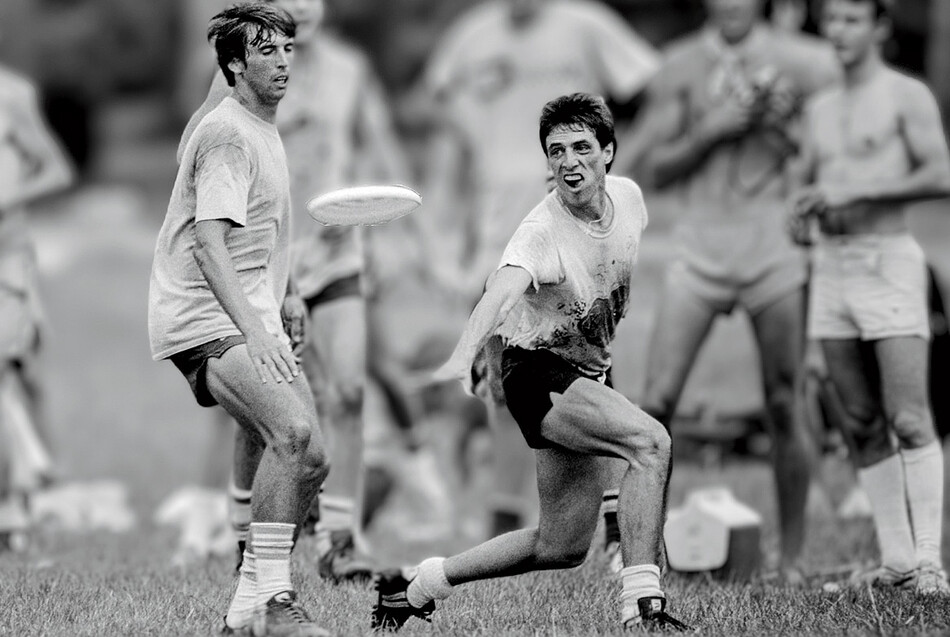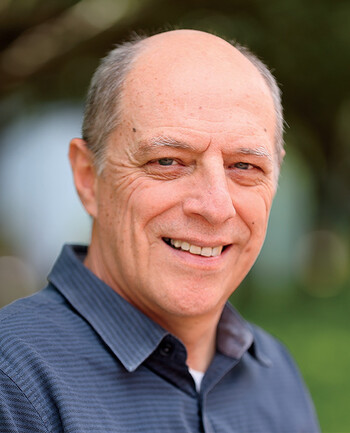In the fall of 1977, Mauricio Matiz ’79SEAS, ’84SEAS, a third-year computer-science major, was lounging on the Low Library steps when he noticed some guys on South Field throwing around a Frisbee. Matiz, who was born in Colombia and raised in Astoria, Queens, had tossed a Frisbee on the beach a few times and generally associated the game with picnic blankets and bare feet. But these guys weren’t picnicking. They seemed like athletes.
Matiz was an athlete too: he ran track and played intramural football, volleyball, and soccer. Curious, he walked down to the field and asked to join in. One of the players, a guy named John, whizzed the disc at him — hard. Matiz, surprised, caught it and floated it back. John grabbed it and flicked another mean heater. Matiz caught it, almost in self-defense, thinking, Man, that’s so unfriendly.
But once Matiz learned that the guys were part of a student club devoted to Ultimate Frisbee — a noncontact sport in which teams try to pass the Frisbee down the field to score a goal — it made sense: the idea is to keep the disc away from the opposing team, so your throws have to be hard and tight. “It reminded me of basketball and soccer: you have six other people running around, so you have to have a sense of the movement of the field,” Matiz says. He joined the club, practiced his throws — forehand, backhand, and hammer (an overhead toss) — and began competing against teams from Princeton, Rutgers, and Cornell.
Though Matiz was just five feet nine, his ability to leap great heights allowed him to snag those whistling projectiles in midair, beyond the reach of taller opponents. He was a force on both sides of the disc and became the team’s emotional leader. “I was a very aggressive player, very competitive,” says Matiz. “I hated to lose.”
After graduating, Matiz began working with other sorts of disks — floppies and hard drives — at the Columbia University Center for Computing Activities (later called Academic Information Services), which he joined in 1982. By then, he and Ultimate player Ken Gary ’81SEAS had formed a New York City team, the Heifers, part of the new Ultimate Players Association (now called USA Ultimate), the sport’s official governing body. Later, Matiz would form another team, Kaboom!, which went to the national championships four years in a row, reaching the finals in 1985, where they lost to the Berkeley Flying Circus.
Matiz played for twelve years, and last November he was elected to the Ultimate Hall of Fame. Only 132 people have received this honor since 2004, in a sport with millions of players.
Impressive, yes, but Matiz ascended to similar heights at Columbia. In 1998, he and Frank Moretti ’76GSAS, ’83TC of Teachers College, tasked with bringing technology into the classroom, started what is now the Columbia Center for Teaching and Learning. They oversaw hundreds of projects, creating multimedia learning tools for The Autobiography of Malcolm X, Salman Rushdie’s Midnight’s Children, and many other works. Matiz retired in 2023 after forty-two years, and at his send-off at Faculty House, colleagues praised him as “our tech captain.”
Matiz, who lives on the Upper East Side, continues to build his legacy. He is married to a former Ultimate player and has two grown children. He is on the executive committee of the Columbia Fiction Foundry, a workshop for alumni writers that also hosts literary and networking events. And until recently — before the US government paused the refugee resettlement program — he volunteered at the Migrant Center of New York, where he helped people fleeing from Venezuela and Ecuador fill out their asylum applications. As an immigrant himself, he wanted to do something to “counter the callousness that had arisen” against those who were “trying to find a better way.”
Whether it’s Frisbee, computing, writing, or lending a hand to others, Matiz pursues all his interests with the same sense of purpose and dedication. “When you start doing something and realize you could be good at it, it just feels right,” he says. “And I’ve always found that the better you get at something, the more you want to do it.”




